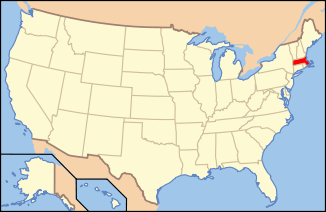Alcohol laws of Massachusetts

The serving of alcohol in the Commonwealth of Massachusetts is governed by the Alcoholic Beverages Control Commission (ABCC), which is responsible for issuing licenses and permits for all manufacturers, wholesalers and importers, out-of-state suppliers, brokers, salespeople, warehouses, planes, trains, ships, ship chandlers and vehicles transporting alcoholic beverages.[1]
Drinking age
On December 4, 1984, Governor Michael S. Dukakis signed a bill raising the drinking age from 20 to 21 in Massachusetts. This bill was in response to the National Minimum Drinking Age Act which would reduce federal highway funding by 10% for any state that did not adopt a drinking age of 21.[2] Those under 21 can, however, consume alcoholic beverages on private premises with parental consent.[3]
Establishments accepting, in good faith, the following as proof of age are protected if underage patrons are served accidentally:[4]
- A Massachusetts Driver’s License
- A Massachusetts Liquor Identification Card
- A Massachusetts Identification Card
- A Passport Issued by the United States or a government that is officially recognized by the United States
- A Passport Card for a Passport issued by the United States
- A Military Identification Card
Transportation of alcohol
Individuals can transport alcohol without a license, up to but not exceeding, twenty gallons of malt beverages, three gallons of any other alcoholic beverage, or one gallon of alcohol at a single time.[5] People under 21 years of age may not knowingly drive a car with alcohol inside unless they are accompanied by their legal guardian. This also means a person under the age of 21 cannot drive a vehicle with alcohol inside even if it belongs to a person over the age of 21 who is also inside the vehicle. Violators can be fined and/or have their driver's license suspended for three months.[6]
Drunk driving
Driving under the influence of alcohol in Massachusetts is a crime that is punishable by a fine and/or imprisonment. Massachusetts' maximum blood alcohol level is 0.08% and 0.02% if the driver is under 21 years of age.[7] Operating under the influence penalties can vary depending on prior OUI offenses.
| Fine | Jail | Driver's License Suspension | |
|---|---|---|---|
| 1st Offense | $500–$5,000 | None - 2½ years | 1 year |
| 2nd Offense | $1,000 - $10,000 | 30 days - 2½ years | 2 years |
| 3rd Offense (felony) | $1,000 - $15,000 | 150 days - 5 years | 8 years |
| 4th Offense (felony) | $1,500 - $25,000 | 1 – 5 years | 10 years |
| 5th Offense (felony) | $20,000 - $50,000 | 2 – 5 years | Lifetime |
Happy Hour ban
Bars and restaurants in Massachusetts are prohibited from offering discounts on alcoholic beverages; this includes a total ban on "happy hour" promotions.[9] Establishments are not permitted to offer a drink special even for a day; prices must remain the same throughout the calendar week.
Social Host Law
The host of a party can be held liable for a guest who causes injury to others if it is proved that the host knew or should have known that the guest was intoxicated but continued to allow the guest to drink alcoholic beverages.[10]
See also
References
- ↑ - Alcoholic Beverages Control Commission
- ↑ New York Times 1984/12/05
- ↑ The exemption for furnishing is found in 138 M.G.L. Sec. 34. The exemption for minor possession is found in 138 M.G.L. Sec. 34C. There is no separate explicit prohibition of minor consumption or of internal possession.
- ↑ ABCC 2012 Identification Card Advisory
- ↑ http://www.mass.gov/legis/laws/mgl/138-22.htm
- ↑ http://web.mit.edu/alcohol/www/laws.html#mass1
- ↑ Massachusetts Drunk Driving Law Center
- ↑ http://dui.drivinglaws.org/mass.php
- ↑ http://www.mass.gov/abcc/pdf/ABCC%20HAPPY%20HOUR%202009%20Notice%20to%20Industry%20holidays.pdf
- ↑ http://web.mit.edu/alcohol/www/laws.html